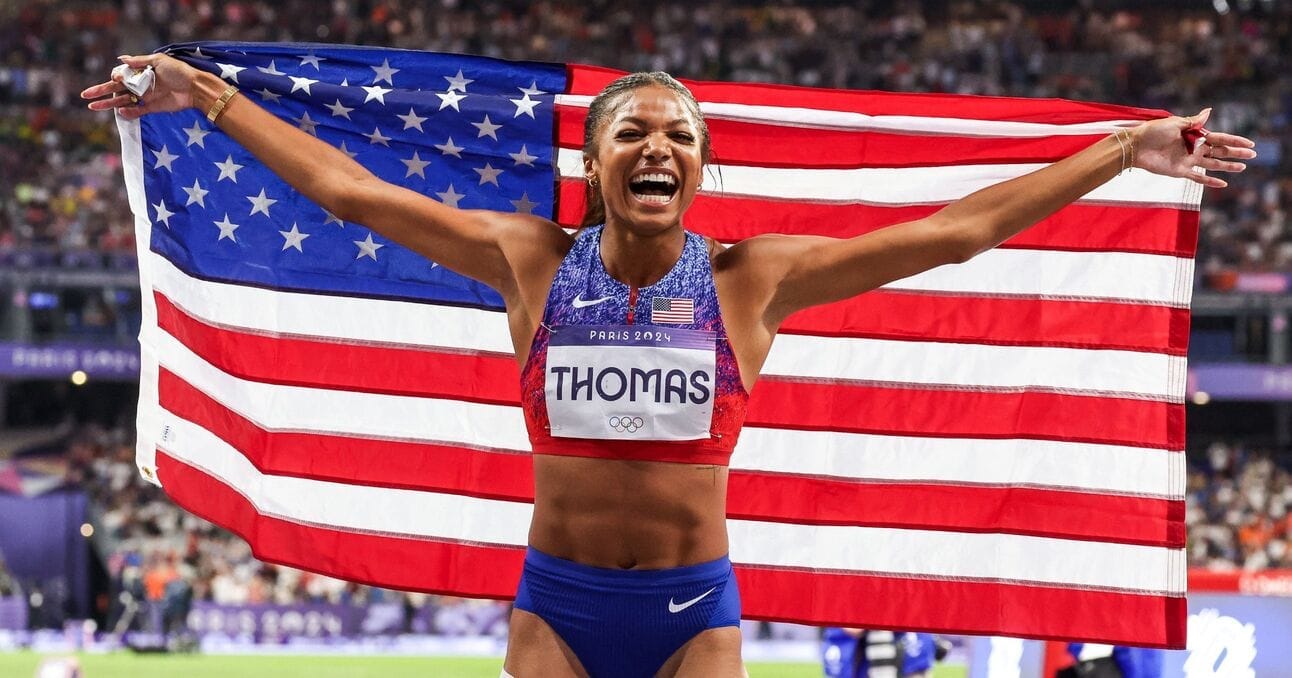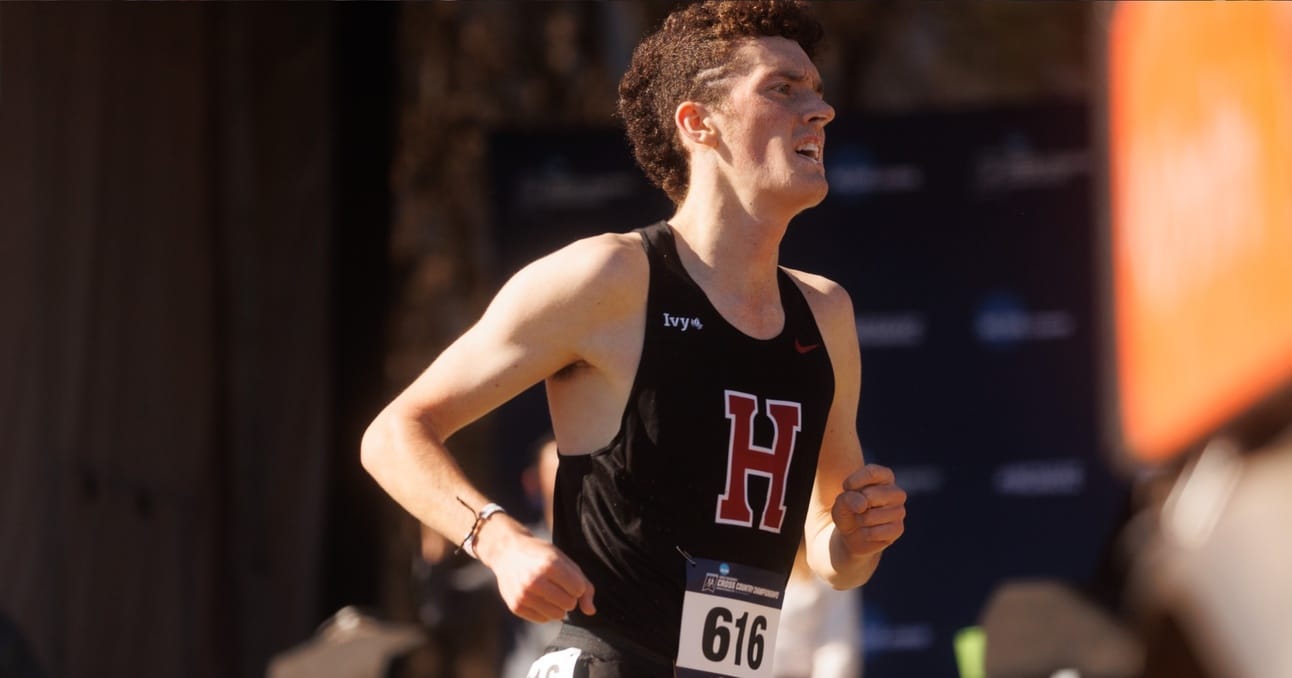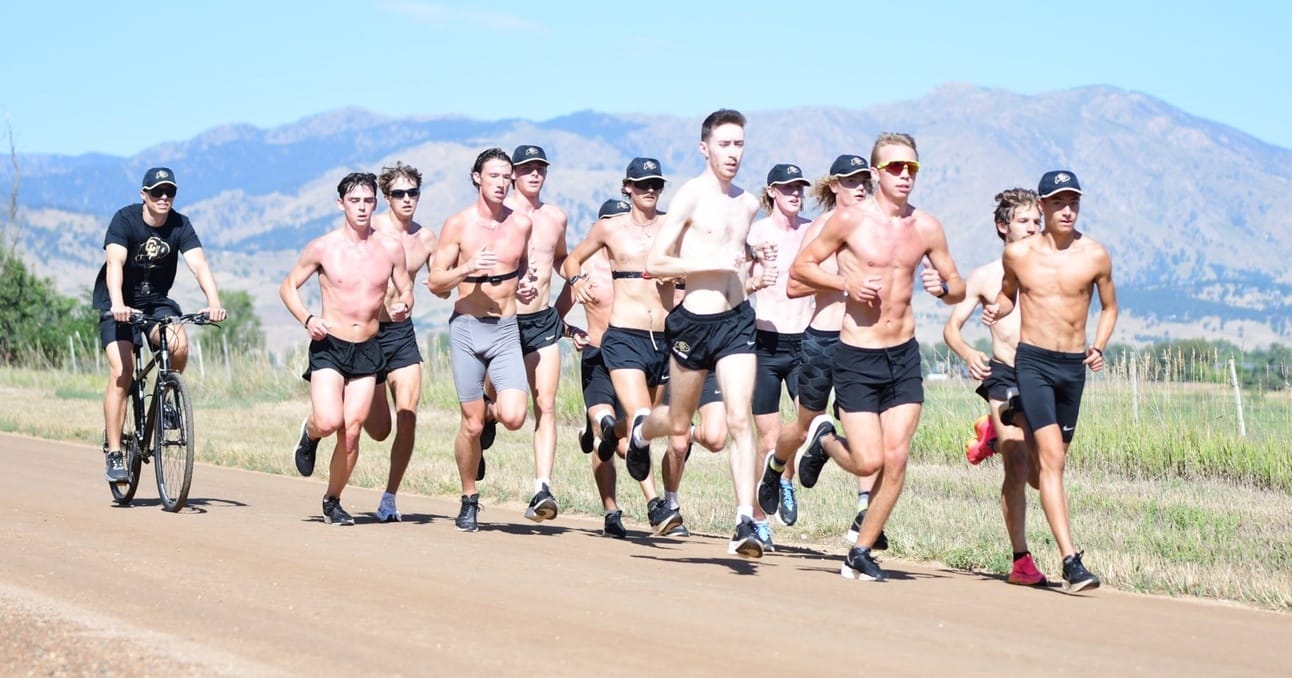What Now? ⏱️
Lap 187: Sponsored by ASICS

Visit ASICS.com to shop the NovaBlast 4.
While some are laser focused on an upcoming fall marathon, others may have their eyes set on an annual Turkey Trot or even a Haunted Halloween 5k. For whatever your next objective may be, ASICS has the NovaBlast 4, the perfect shoe to provide a bounce in every step as you reach all of your running goals. The NovaBlast 4 is one of ASICS’ most popular models and there a variety of new colorways now available now at select local running stores in the U.S. or visit www.ASICS.com.
Compiled by David Melly, Paul Snyder, Jasmine Fehr, and Audrey Allen.
How To Be A Running Fan In The Fall 🍂

Gabby Thomas after becoming the 200m Olympic champion in Paris. (Photo by Kevin Morris / @kevmofoto)
The Diamond League is officially over. The Olympics are a fast-fading memory. And, if you’re living in the right part of the Northern Hemisphere, there’s a chill in the air, leaves on the ground, and sweater season on the horizon.
That means that for sprinters, jumpers, and throwers, the next big dates circled on the calendar are, at the earliest, a few indoor meets in January, and – if your coach adheres to Formula Kersee – it could be as late as a pre-USAs tuneup in July.
What’s a track fan to do?
Keep watching track: The first official day of autumn was last weekend but we’ve still got at least one major track meet coming up: the Athlos NYC women’s track exhibition spearheaded by Olympic champ Gabby Thomas and Reddit co-founder/Serena’s-umbrella-holder Alexis Ohanian, taking place at Icahn Stadium tomorrow night at 7pm. There are only six races but they’re stacked from top to bottom: Four of the events feature the reigning Olympic champion. It’ll be quite the party atmosphere with rapper Megan thee Stallion (congrats to Megan on her first bolded mention in this newsletter!) set to perform and a hefty prize purse offering $60,000 for first place finishes.
It’s hard to say what the most exciting event on the schedule is, but the program is sandwiched by a pair of interesting head-to-head battles. In the 100m hurdles, Olympic champion Masai Russell takes on fellow Wildcat and former Olympic champion Jasmine Camacho-Quinn, as well as reigning World champion Danielle Williams of Jamaica. In the 1500m, Faith Kipyegon will match up against Gudaf Tsegay in Tsegay’s first race since her Olympic triple that also featured a shoving match between the duo during the 5000m final. The two have since made amends, but it’s always exciting to watch the first- and third-fastest women in history in the event do battle.
Wake up early for some seriously fast marathoning: Sunday kicks off the second half of the World Marathon Majors circuit with the Berlin Marathon, which sends off its elites at 8:50am local time a.k.a. 2:50am Eastern Daylight Time (or a sensible 11:50pm on the West Coast!). If you thought Boston was a big deal, keep in mind that Berlin, at 58,000 or so participants, is nearly twice the size.
Neither the men’s nor women’s defending champion is on the start list, so we’ll see a new name atop the podium in both races. On the men’s side, seven of the last eight editions of the race have been won by either Eliud Kipchoge (five times) or Kenenisa Bekele (twice, plus a third-place finish in 2021), but both athletes had terrible days in Paris and their respective retirements seem increasingly imminent. Along with the tragic death of world record holder Kelvin Kiptum in February, the throne of World’s Greatest Marathoner is conspicuously empty at the moment, and many of the men on the start line will be vying to take a seat. The most intriguing contender is Kenyan Kibiwott Kandie, who’s “only” run 2:04:48 but is the former world record holder in the half at 57:32 and is brimming with potential.
On the women’s side, the rising star of the moment is Ethiopian Tigist Ketema, who’d never run a marathon before 2024 but has now run the fastest debut ever (2:16:07 in Dubai) and finished seventh in London against a crazy-stacked field. The flat, fast course of Berlin (which has seen two world records in the last two years) could produce another historic time from Ketema, Kenyan Rosemary Wanjiru, or even someone like former 1500m world record holder Genzebe Dibaba, if they play their cards right. Well worth an early alarm and a few missed hours of sleep!
Tailgate your favorite cross-country meet: Even if racing cross-country isn’t for you, the fall race schedule offers plenty of opportunity to pack a picnic, crack a beer, and enjoy the fresh air before madly sprinting across a golf course, cornfield, or college campus in chaotic bursts to scream in the faces of your favorite harriers as they suffer through a muddy, hilly team battle. Take a page from the College Gameday – just because the marquee races are over in less than an hour of running time doesn’t mean you can’t make your XC fandom an all-day social event full of music, friendship, and, if you’re feeling particularly confident, the subtle and sophisticated art of body painting.
Speculate wildly about the future: An important element of all major sports is filling the offseason with gossip, rumors, and hypotheticals about the futures of your favorite pro athletes. With an Olympic cycle coming to an end, we’re guaranteed to see changes aplenty as the biggest stars of 2024 land their next big brand deal and the also-rans consider going to grad school. With contracts commonly coming to an end with calendar years, we’re sure to see exciting realignments of training groups, sponsor affiliations, and coach-athlete pairings designed to shake things up for the coming season.
We already know that Nike is making big news in the coaching space. Will we look back on Paris as the end of an era for some of the biggest names of the last decade in track and field? Some athletes, like British vaulter Holly Bradshaw, have already announced their retirement, while others, like 3x Olympic hammer throw champion Anita Wlodarczyk and former 400H world record holder Dalilah Muhammad, have said that Paris would be their final Olympics but that 2024 may not be their last year competing. And then, of course, there’s the equally-important athletic tradition of major stars retiring, then un-retiring, then retiring again, so if your favorite star says goodbye, keep in mind that history has shown there’s always an opportunity to return if the circumstances (and money) are right.
So don’t let our Olympic-centric mediaverse fool you into thinking that fall is a quiet time for the sport. There’s plenty to look forward to in the days, weeks, and months to come – you might just have to pack a few extra layers or adjust your internal clock to enjoy the fun.
7 Storylines To Follow This NCAA XC Season ✍️

Harvard’s Graham Blanks will look to defend his NCAA Cross Country Championships title from 2023. (Photo by Johnny Pace / @pacephoto)
The rust is busted, season-openers dusted, and NCAA cross country is in full swing. In case the November 23rd championship isn’t already circled on your calendar, here’s a quick preview of some of the best narratives to follow this season:
Graham’s got a Blanks space, baby
Olympic 5000m finalist Graham Blanks is looking to get more than just a degree from Harvard this year – he wants to defend his NCAA cross country title. One of his chief competitors will be UNC's Parker Wolfe, who edged out Graham for third at the U.S. Olympic Trials. In addition to his outdoor 5000m title, you can’t forget about Parker’s ninth-place finish at last year’s cross country championships; he’s shown both strength and speed. The plot thickens as both seniors head into the fall NCAA champions hungry for another collegiate crown and are likely to go head-to-head once again.
N.A.U.: Not An Underdog
NC State will be looking for the first four-peat since Villanova in the 90s despite the loss of top 2023 scorers Katelyn Tuohy, Amaris Tyynismaa, and Samantha Bush. After falling short by a single point at last year’s championships, NAU feels overdue for their first team title, and returns familiar faces Elise Stearns, Ali Upshaw and Olympic Trials 1500m finalist Maggi Congdon (1500m greatness actually serves as a solid predictor for 6K performance on the grass). They’ll be challenged by the Wolfpack’s sophomore duo of Grace Hartman, coming off of a strong track season, and top-50 2023 finisher Leah Stephens. Coach Laurie Henes also added DIII standout Fiona Smith through the transfer portal, and the 16x(!) All-American looks to make a big impact in her grad year.
The boys are (Razor)back in town
Yaseen Abdalla of Arkansas (and formerly Tennessee) might be the most interesting story to follow this cross country season. Despite a poorer than expected showing at last year’s champs, the two-time cross country All-American is now an Olympian, where he had an impressive marathon debut in 2:11:41 for Sudan. But he’s not the only Razorback in the mix. Patrick Kiprop displayed promising improvement last season moving from 24th in 2022 up to seventh last year. While the Arkansas program has the most men’s cross country titles to their name, they haven’t added gold to the trophy shelf in a while but are sitting in third in the most recent USTFCCCA coaches’ poll.

USTFCCCA Week One Rankings | Men
Time for Hildamania?
Florida might’ve lost last year’s winner and six-time NCAA champion Parker Valby… but don’t count the Gators out for the individual or team title thanks to Alabama transfer Hilda Olemomoi. A rising junior, the Kenyan is arguably more capable of filling Valby-sized shoes than anyone as she was the runner-up in both the 5K and 10K at last year’s outdoor championships, plus cross country podium sixth and fourth-place finishes in 2022 and 2023, respectively. Joining her is super-senior Allison Wilson who finished 49th a year ago. An impressive progression on the track after taking two years off, coupled with a hunt for her first All-American berth could be the key to leading the team to another top-five finish.
Olympic snub consolation season for Habtom
If anyone knows how to run a 10K in the NCAA, it’s Habtom Samuel of New Mexico. Despite hitting the Olympic standard, he wasn’t selected by the Eritrean Committee to compete in Paris this summer but hopefully can fill that 25-lap void with a W in the midwestern snow later this year. Since his runner-up finish at the XC championships last year, the Lobo won the outdoor 10,000m title and boasts the second-fastest mark all-time in the NCAA. His resume looks pretty strong going into the fall, and we even got an inside scoop on how his training is progressing in our interview with Coach Darren Gauson last week.
End of the Clinger Era for BYU men
Given that he was a true freshman in 2017, hopefully Casey Clinger’s endurance in the NCAA correlates to this strength in cross country. The BYU standout is coming back after a one-year hiatus from the NCAA, and he sure isn’t alone as the Cougar men have the depth to be ranked second heading into this weekend of late-September meets. And if anyone knows how to chase demanding expectations, it’s cross country All-American and recent steeplechase Olympian James Corrigan, who looks to make a big leap from his 32nd place finish last year.
Ducks vs. Dawgs: Big 10 Style
Oregon might be shaking things up in a new conference, but their starting lineup looks familiar – they’re returning six of their seven from NCAAs last year. They include the Ducks’ top returning scorer, Maddy Elmore, as well as Polish Olympian Klaudia Kazimierska (who found herself on a meteoric middle-distance trajectory over the summer in the 1500m). Post-XC transfer Silan Ayyildiz took flight for the Ducks on the track last year, and a 15:15.84 5000m means she could be a key cog to Oregon’s success. Meanwhile, the Washington women added key transfer and previous ninth-place finisher Amina Maatoug, among returners and middle-distance studs Chloe Forester and Irish Olympian Sophie O’Sullivan. These two already showed impressive range in their 6K performances last fall, and that’s even before considering their development on the track. While the UW women beat Oregon’s squad at last year’s championships, the Ducks are sitting one spot ahead in the most recent USTFCCCA’s coaches’ poll.

USTFCCCA Week One Rankings | Women
Now, armed with the storylines to follow the sport, go forth and enjoy the first big weekend of the 2024 NCAA cross country season! Don’t miss the Gans Creek Invitational, FSU’s Pre Regional meet, and the Nuttycombe Wisconsin Invitational, all on Friday, then on Saturday, the Cowboy Jamboree.
Sponsored by Canadian Running Series

Challenge Yourself at the TCS Toronto Waterfront Marathon!
Tackle your next big race at the TCS Toronto Waterfront Marathon! Choose from our marathon, half marathon, or 5K event. Celebrate running in a city that cheers louder with the on-course support of over 30 marathon cheer sites. Let’s run.
Colorado's Sean Carlson On Rebuilding The Buffs’ Cross Country Program As New Director 🦬

Courtesy of Colorado Track & XC / @cubuffstrack
In our second NCAA coach spotlight, Jasmine Fehr caught up with Sean Carlson to reflect on his first few months as the University of Colorado’s Director of Cross Country and Track & Field.
Carlson joined the Colorado Buffaloes this summer after spending two years at the University of Tennessee as head coach and 11 years prior coaching at Notre Dame. His time with the Irish was highlighted by coaching several athletes to national titles as well as a runner-up team finish at the NCAA Cross Country Championships.
In our conversation, Carlson shared his vision to revitalize the Buffs’ cross country program, what he values in creating a positive team culture, how his coaching philosophy has evolved throughout his career, and what fuels his excitement for the journey ahead in Boulder.
The following interview excerpt with Sean Carlson has been edited lightly for length and clarity. You can find the full interview here.
CITIUS MAG: Welcome Sean Carlson! Before taking over at Colorado, you were at Tennessee. The women's cross country team hadn't qualified for NCAAs since 2006, and within two years, you led the women to a sixth-place national finish. As you take this next step in your career, what excites you most about rebuilding Colorado's cross country program?
Sean Carlson: I've been fortunate to be a part of programs that were historically very successful [Notre Dame and Tennessee]. When I started both of those positions, they weren't in their traditional place. When I took over at Notre Dame, we were 14th in the region during my first year. By the time I left, we were second at nationals. At Tennessee, the women hadn't qualified [for NCAAs] in over a decade and they finished sixth. I really enjoyed the process of being able to continue to rebuild a tradition and rebuild a successful program.
Colorado has an incredible tradition and it’s been successful at the highest level of NCAA cross country. But I also know that last year was a bit of a difficult year for the program. We slid a little bit from the standard. The thing that’s exciting about that is we get to start fresh. It's really hard to take over a program that just won nationals. It might be fun in the fact that you're relevant, but I think you can shape it a little bit more to the identity and culture that you want while still valuing and respecting the traditions of the past.
I've really enjoyed my opportunities to help grow and guide some programs. Colorado is a place that I can grow and hopefully guide back to winning national titles. There are a lot of things changing in college athletics that will make those challenging adventures, but adventures nonetheless.

Courtesy of Colorado Track & XC / @cubuffstrack
Speaking of changes in college athletics, we've seen many recent developments in terms of NIL deals, roster limits, athlete ages, and scholarships. As a coach, how have you navigated the changing landscape of NCAA athletics?
I think there will be a higher level, or a deeper level, of competitiveness. SEC schools that have historically been sprints-heavy might now have really good distance programs. Those scholarship limits will change a lot and will change the competitiveness of teams. Each program is going to have to focus on what they feel they can do in terms of their budget… In some programs, that means everything: sprints, jumps, throws, distance. Some programs are going to be limited in those resources and they'll have to focus on the things that they feel they can do well. They’ll invest their scholarship money or roster spots into a few areas. I think that’s going to be different for every program. Here at Colorado, we've historically been very successful at distance running and we plan on continuing that.
There's a massive amount of foreign talent entering the NCAA and a massive amount of talent that is older. In the past, it used to be: take a good guy out of high school that's run 9:00 and they can be relevant pretty quickly. Now that 9:00 guy is just not relevant to be quite honest, at least not initially. There are exceptions to that rule. Last year at NCAAs for cross country on the men's side, there was one freshman and one sophomore who were American in the top 100. That's a wild statistic. It just shows you how deep the NCAA has gotten with talent, and not just talent from the U.S. that is 18 years old… It’s talent from around the world that is a pretty wide range of ages.
In our sport, age and development helps. That's going to be a big factor in everything here at Colorado. We're still committed to getting the top American distance runners out of high school and developing them. But we also recognize that transfers are going to be a factor in being competitive immediately. It takes time to develop kids. The expectation of Colorado is to be good now and to develop kids. We're trying to do two things at once; we're trying to manage a balance because the NCAA has changed. It’s very deep and really competitive right now.
Building off of that, what are some of the biggest challenges that you anticipate facing as you grow into your role?
The expectation of Colorado is to win. We've got a lot of national titles and winning isn't easy. The landscape of what a winning team looks like has changed a bit. That will be a challenging thing to balance.
A really important one for us is going to be finding the right kids. At Tennessee, we were sixth at nationals with a group of women where none of them had run under 10:25 for two miles in high school, which is really impressive. I'm really proud of that stat. In the last couple of weekends where we’ve brought kids on campus, I don't think we brought in a girl over 10:25 for two miles. That just puts it into perspective.
Moving to your personal coaching philosophy, how would you define it and how has it evolved over the years?
Every season it continues to evolve. Even just coaching in our sport in the last five years has evolved pretty drastically. Just look at training methods like the introduction of double threshold.
My approach is to be very flexible. Last year when I was at Tennessee, there were no workouts where we had all of our top seven women doing the same workout. That just shows that you have to lean into the things that people are good at, recognize when people need a rest day, recognize when people are feeling beat up, and be able to adjust based on that. I think that can lead to a really good result if you use it in the right way.
There are factors that go into being successful in college and in distance running. Talent is certainly one of those God-given abilities, work ethic is one of those, and durability is one of those. The coaching piece is one of those too. To be quite honest, I think you have to have at least three of those four to be competitive on the national scale.
To Breathe New Life Into Road Racing, Maybe It’s Time To Bring Back Being A State Champion 🏆

2024 Olympic Marathon Trials | Men’s Field. (Photo by Kevin Morris / @kevmofoto)
In the first of what will almost certainly be a one-part series, we float an idea that is very dumb, but also potentially very fun.
If we get an Olympic Trials Marathon in 2028, we can expect the qualifying standards to be even faster than they were for 2024. This will result in a three-year mad dash to Sacramento or Duluth or Berlin or Chicago to hit those loftier marks. That means that two increasingly major factors in qualification are being well-resourced (those travel costs add up!) and living a flexible life (remote workers and childless 20-somethings have far fewer unmovable obligations). And it means that non-conventionally fast marathons and non-World Majors will continue to be avoided like the plague, which harms local running scenes.
Business as usual will likely produce fields of 200 or so runners, who are primarily pros or semi-pros based out of Flagstaff or Colorado and a handful of 20-something project managers and tech consultants – all of whom are adept at running flat or net-downhill fair-weather marathons. No shots at either of those demographics, but part of the fun of the Marathon Trials is that in addition to selecting a strong Olympic team, it also serves as the People’s Championship.
The Olympics (and World championships) select their fields from a combination of time standards, world rankings, and automatic qualifiers – why should the Olympic Trials be any different? At the end of the day, people like winners, and people want to be winners. No one scrawls “Finish top 45 at CIM” on their bedroom wall as a kid.
So here’s our silly proposal: make the qualification time as steep as you want, or better yet – just invite the top 50 athletes on descending order. Then round out the field with the winners of a Marathon State Championship series. Pick one established marathon fielded annually in each of the 50 U.S. states and anoint it that state’s championship marathon. The winner (ideally a resident of the host state) of each race’s 2027 edition receives automatic entry into the Olympic Trials.
What makes for a cooler story? Spending thousands of dollars to travel the continent – or globe! – in order to find the perfect race in which to join a throng of runners and ride a wave of attrition to the promised land of a desired time? Or claim ultimate “hometown hero” status by mastering a challenging course, in front of your friends and family, to become the State Champion?
This being the Dumb Idea Corner, there are kinks to be ironed out in this proposal. What happens when half of NAZ Elite “moves” to Alaska and Wyoming just by paying a few months of rent, or when the 20th fastest marathoner from California misses an OTQ in favor of a slower Rhode Islander? Maybe there are tweaks to be made, or maybe that’s just life. What this Eurovision model lacks in true parity, it makes up for in INTRIGUE. Imagine the Montana Marathon Champion – who qualified at 6,000 feet in a time 20 minutes behind the conventional OTQers – coming out of nowhere to finish 10th. Local news would go bananas. And it gives an expensive, elaborate event production new avenues for storytelling beyond the six lucky people who make the team.
It’s not a perfect system – but then again, neither is the existing OTQ. All we ask is that the higher-ups at USATF consider this silly idea before they roll out the standard press release of new times and qualifying dates and call it a day.
Rapid Fire Highlights 🔥

4x100m Olympic champion and 100m bronze medalist, Melissa Jefferson. (Photo by Kevin Morris / @kevmofoto)
– The first two episodes of BORN TO RUN, the inspiring story of Bruce Springsteen’s Jakob Ingebrigtsen’s journey from New Jersey Norway to rock stardom Olympic gold, is now available to stream on Amazon Prime. If you want to hop on the podcast watchalong trend popularized by the Office Ladies, you can listen to Chris Chavez and Preet Majithia break down the first two episodes on the CITIUS MAG feed.
– Per the Anti-Doping Agency of Kenya, the country risks being banned from international competition after the agency’s funding was slashed, rendering it unable to perform the level of testing necessary to be WADA-compliant.
– Sinclaire Johnson has left the Union Athletic Club, and will not be making the move to Colorado with the Pete Julian-coached group. Per Sarah Lorge Butler, Johnson will remain in Portland and spend additional time training in Park City, Flagstaff, and Phoenix.
– Olympic medalist Melissa Jefferson has been announced as the latest Grand Slam Track signee, making her the first woman to join the league in the short sprints category. CITIUS MAG’s Paul Hof-Mahoney wrote a bit about what this announcement might mean for GST here.
– New Jersey high school distance running powerhouse Christian Brothers Academy extended its dual meet win streak to 500 last week. The last time the school lost a dual meet, it was September of 1974 and Eric Clapton’s god awful cover of Bob Marley’s “I Shot the Sheriff” was the number one song in America.
– In LinkedIn news, Olympic 1500m bronze medalist Georgia Bell has quit her day job. While that may be a devastating blow to the world of cyber security software sales, those of us who are bigger fans of track and field are collectively happy for her.
– Ultramarathoner Camille Herron found herself at the center of a hilarious scandal as Canadian Running reports she’s been caught making pro-Camille edits to her own Wikipedia page and editing out positive elements of other top runners’.
– On Long Island at Great Cow Harbor 10k, which served as this year’s USATF 10k championships. Biya Simbassa prevailed in the men’s race, holding off Hillary Bor and other road stalwarts in 28:18. For the women, Jessica McClain continued her 2024 hot streak, and put 20 seconds on second-placer Natosha Rogers, crossing the line in 31:40. (Full results)




